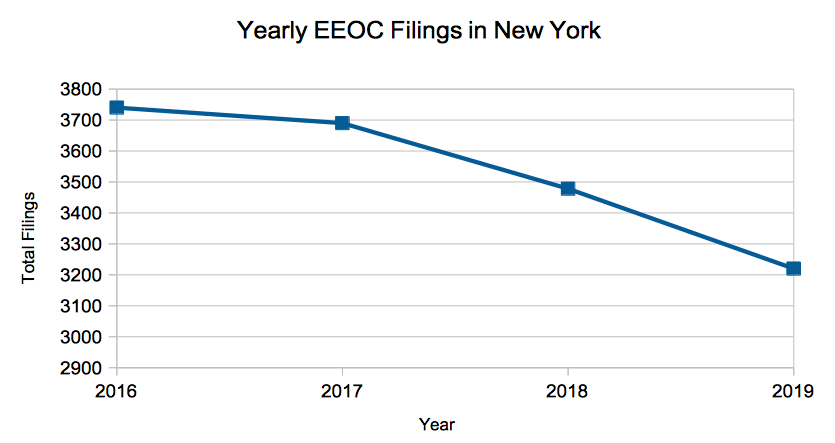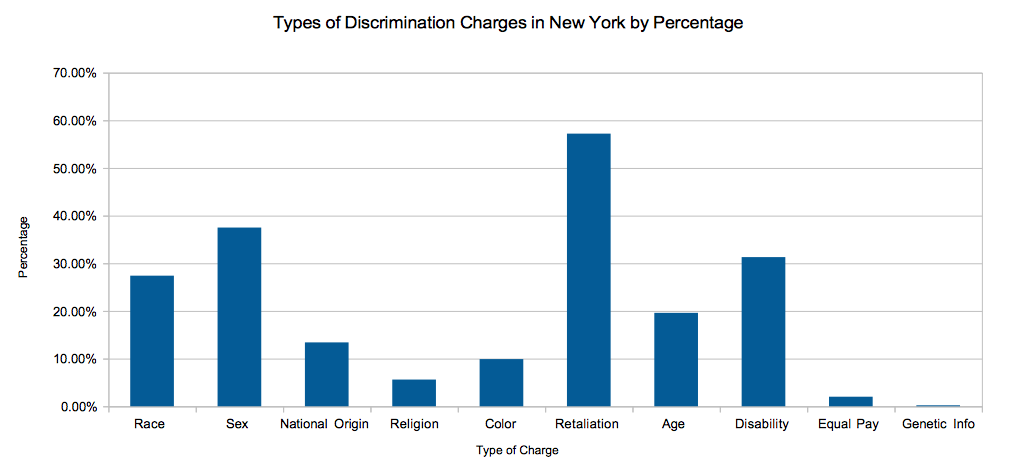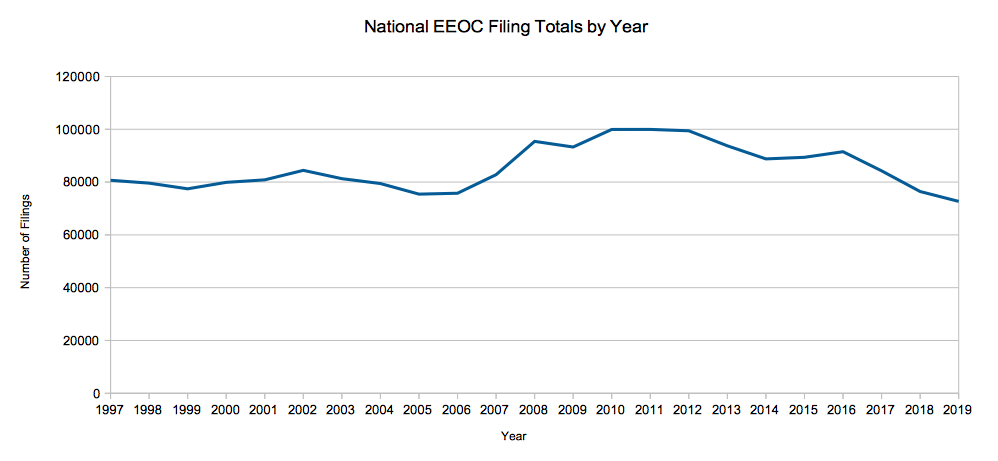The Equal Employment Opportunity Commission (EEOC) is the federal agency charged with investigating and prosecuting claims of discrimination arising under federal law. Generally, federal law prohibits workplace discrimination on the basis of sex, race, national origin, religion, color, disability, age, and genetic information. Further, federal law prohibits employers from retaliating against employees who report or oppose unlawful workplace discrimination.
Before an employee may sue an employer for discrimination or retaliation (arising under federal law) employees must file a charge of discrimination with the EEOC. In January 2020, the EEOC published data reporting the number of charges filed across the United States and its territories in 2019. The publication shows the number of filings broken down by state and type of charge, and percentage of charges as a total of all filings and as a percentage of all filings within the state. Today’s Long Island employment law blog discusses the EEOC’s report.
New York saw a total of 3,220 EEOC charge filings (or 4.40% of all charges filed in the United States). This shows a continued a downward trend of EEOC charges in New York. As pictured in the graph below, in 2016, New York saw 3,740 total EEOC filings which steadily decreased to 3,220 last year.

Yearly New York EEOC filings
The breakdown of charge types is not surprising to those who regularly handle employment discrimination matters. The filings included 1,841 claims of retaliation. In other words, 57.20% of all filings were related to retaliation. This is not surprising because discrimination claims are often associated with retaliation. Indeed, the percentages reported in the EEOC report exceed 100% because EEOC charges frequently allege more than one type of charge, such as age discrimination and retaliation.
Frequently, an employee may believe he or she was subjected to discrimination in the workplace and reports it to the employer. Through the eyes of the law, the employee may not have, in fact, faced discrimination, but if the employee had a good faith basis to believe he or she was reporting unlawful discrimination, the report is protected. If the employer retaliates against the employee, the retaliation is still unlawful, even though the underlying conduct may not have been unlawful discrimination. This is why it is so important for employers to train management and employees about discrimination and retaliation laws.
After retaliation charges, several types of discrimination lead the way. Sex discrimination and disability discrimination rank at the top. Sex discrimination filings represent 37.50% of EEOC charges and disability discrimination charges represent 31.30% of filings. Again, these statistics are not surprising. Sex discrimination continues to be prevalent in New York’s workplaces, even with the extensive publicizing of the epidemic through the #metoo movement and the government’s push for education. In fact, in 2019, New York required all employers to train their workforces about sex discrimination.
Close behind sex discrimination charges is disability discrimination charges. At 31.30%, disability discrimination charges are likely prevalent because of how easy it is for employers to find trouble. Disability discrimination can take many forms such as failure to accommodate, hostile work environment, and adverse actions taken against employees who miss work because of a disability, take leave, or otherwise try to exercise rights protected by the Americans with Disabilities Act.
Not far behind sex and disability discrimination comes race and age discrimination charges. Race discrimination charges comprise 27.40% of all New York EEOC charges and age discrimination claims reached 19.60% of all charges. The complete breakdown of charge types filed in New York is illustrated in the below graph.

Types of EEOC Charges Filed in New York 2019
Nationally, total EEOC filings dipped to their lowest levels in 22 years. In fiscal year 2011, filings peaked at 99,947. Since then, filings have trended down, reaching a total low of 72,675 last year. The trend can likely be attributed to better education, training, and enforcement. Thus, there are indications that the work towards workplace equality is effective. But, the statistics do not tell the entire story.

National EEOC Filings By Year
Many states, such as New York, maintain their own workplace discrimination laws. In New York, the Human Rights Law allows victims of workplace discrimination and retaliation to file claims directly in court or in the New York equivalent of the EEOC, the New York State Division of Human Rights. So, the EEOC’s statistics do not reflect whether there is an increase in state filings. In other words, federal filings may be trending down, while state filings are trending up. Indeed, many states’ laws, including New York’s, are broader and more employee friendly, than federal counterparts, inducing victims to file in state forums instead of the EEOC.
Which state leads the nation with EEOC filings? The results may be surprising. The answer is . . . Texas, and by a wide margin. Texas saw 7,448 EEOC filings in 2019 or 10.2% of all the filings in all the states and territories. The next closest state is Florida with 5,990 filings, or 8.2% of all filings. These results may reflect the growing diversity of these states.
In sum, some national and New York trends reflected by the EEOC’s statistics suggest a decrease in reported workplace discrimination in 2019. When New York reports about its filings in the New York State Division of Human Rights, we’ll have a better picture about what’s happening in New York, specifically. We remain encouraged that the trends show an increased attention to workplace discrimination and better education throughout the country. But, the numbers also reflect the need to do more.
If you have questions about workplace discrimination or retaliation, contact a Long Island employment lawyer at 631-352-0050. Our website is at http://linycemploymentlaw.com.
 Long Island Employment Law Blog
Long Island Employment Law Blog

